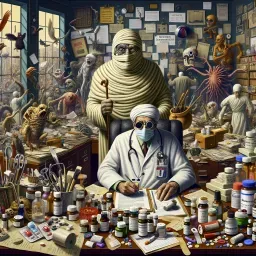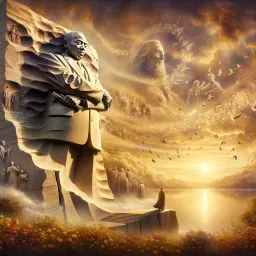Trust, but verify

0
0
0
0
- Meaning
- This phrase encapsulates a balanced approach to trust and accountability. It suggests that while it's important to have trust in others or in agreements, it is equally essential to verify that this trust is well-placed and that obligations are being met. The phrase combines elements of optimism (trust) with pragmatism (verify), highlighting the importance of due diligence and protecting one's interests without descending into either naivete or cynicism.
- Allegory
- The handshake in the foreground symbolizes mutual trust and cooperation, capturing the essence of establishing positive and hopeful relationships. The magnifying glass and checklist subtly integrated into the scene symbolize the verification aspect without detracting from the warmth of the handshake. The sunlight breaking through the clouds in the background symbolizes optimism and clarity, reinforcing the positive aspects of trust. The icons of scales and lock-and-key represent balance and security, signifying that trust and verification go hand-in-hand for harmonious relationships. This arrangement creates a visual narrative that underscores the phrase's message while evoking a sense of balance and cohesion.
- Applicability
- In personal life, this phrase can be a guiding principle. For example, while you might trust family, friends, or colleagues, there's value in setting boundaries and confirming actions and words to avoid misunderstandings and potential disappointments. In professional settings, it might encourage sound business practices, such as conducting thorough research and regular audits, fostering an environment where trust is complemented by accountability.
- Impact
- The phrase "Trust, but verify" has had a significant impact, particularly in political, diplomatic, and business contexts. It underscores the necessity of combining trust with accountability, leading to its adoption in various fields such as contract law, international relations, and corporate governance. It often appears in discussions about transparency, integrity, and due diligence.
- Historical Context
- The phrase gained prominence during Ronald Reagan's presidency in the 1980s, particularly in the context of U.S.-Soviet relations and arms control agreements, where mutual trust was necessary yet insufficient without verification measures to ensure compliance.
- Criticisms
- Critics argue that the phrase might encourage an underlying suspicion that undermines trust. They believe that combining trust with verification could imply a lack of faith in the other party, potentially leading to strained relationships. Conversely, some say that over-reliance on the verification aspect can create an excessively bureaucratic and distrustful environment.
- Variations
- There are variations of this phrase in different cultures. For example, the Chinese proverb "信人者,人恒信之,不信人者,人恒不信之" (Trust others, and they will trust you; distrust others, and they will distrust you) highlights different aspects of the concept of trust, emphasizing reciprocity in trust relationships rather than verification.
-

Politics is the art of looking for trouble, finding it everywhere, diagnosing it incorrectly, and applying the wrong remedies.
-

What we do in life echoes in eternity.
-

With friends like these, who needs enemies?
-

The public service is a public trust.
-

Courage is not the absence of fear, but the triumph over it.
-

All warfare is based on deception.
-

With great power comes great responsibility.
-

To wear one's heart on one's sleeve.
-

We must be the great arsenal of democracy.
-

Genius is one percent inspiration, ninety-nine percent perspiration.
-

Greed is good.
-

Just Do It.
No Comments